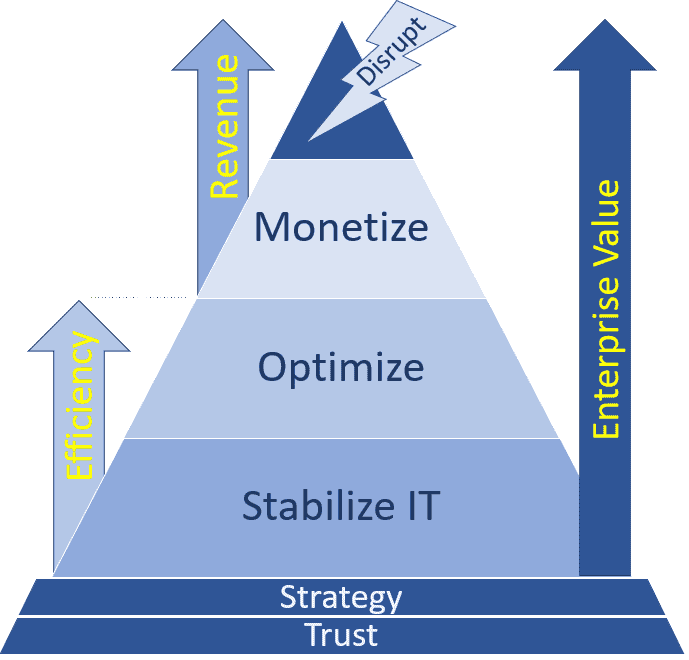Education IT & AI Consulting
Proven IT Leaders with Track Records in the Education Industry
Education IT Experts
Education has always been a driver of progress, and today it is being reshaped by digital tools, mobile access, and virtual learning platforms. From K-12 schools to universities and EdTech providers, institutions face mounting pressure to deliver secure, reliable, and innovative technology that supports both learning and administration.
Through our flagship Contract CIO+® tech leadership service and our foundational CIO IQ® IT & AI Advisory offering, Innovation Vista delivers independent vendor-neutral IT & AI strategy to the Education and EdTech industry. Our consultants bring deep technical expertise combined with real-world experience leading IT across universities, colleges, and EdTech firms. We know where general best practices apply — and where education requires its own tailored approach, such as ensuring secure student records, supporting online coursework delivery, and enabling analytics for student outcomes.
Unlike firms that assign consultants without industry context, our experts have been CIOs and IT leaders in education. With Contract CIO+®, the goal isn’t just stabilizing and optimizing technology — it’s aligning IT with your mission: enabling better teaching, improving student experiences, and supporting research and innovation across the academic landscape.
Achievements for Education clients from our Consulting team
Our Education Scoreboard - Impact & Expertise
A.W. / Large Public University
Led the Enterprise Architecture team through a replatforming & cloud migration initiative, supporting over 50,000 students
D.S. / University EdTech Software firm
Led product engineering to enable 10x user growth in 2.5 years, culminating in an enterprise sale to a university consortium.
G.S. / National Student Database firm
As CIO, led a digital transformation to modernize IT and enable strategic data & analytics capabilities.
J.R. / EdTech Holding company
As Interim CIO, stabilized the IT department's performance, aligning the culture with the organization.
L.K. / Large State University
As CIO, directed a technology uplift which increased performance and stability, while holding costs flat.
L.K. / Private College
As CIO for 9y, implemented governance and enterprise architecture, ensuring smooth systems operations.
L.P. / Private Law School
Led IT for over 4y, implementing and integrating a custom SIS (Student Information System) and major cybersecurity upgrades.
O.E. / Dental College
Led IT for over 6y, implementing new SIS (Student Information System)
State of Innovation in Education & EdTech
Our 2026 Summary of Innovation in the Education industry
The Enrollment Cliff & The AI Campus
Education in 2026 is defined by a demographic reality: the “Enrollment Cliff” is here. Institutions are shifting from growth strategies to efficiency and retention strategies, with technology as the primary lever.
The “Agentic AI” Tutor: We are moving beyond simple chatbots. In 2026, AI agents are embedded in Learning Management Systems (LMS) to provide 24/7 personalized tutoring and administrative support, freeing faculty to focus on mentorship.
Cybersecurity as Student Safety: With schools now the #1 target for ransomware, cybersecurity is no longer just an IT issue—it is a campus safety mandate. “Zero Trust” networks are becoming the standard to protect research IP and student PII.
Stackable Credentials & Lifelong Learning: The traditional 4-year degree is unbundling. Systems are re-tooling to support “micro-credentials” and “stackable certificates,” requiring agile SIS platforms that can handle non-traditional learner pathways.
Operational Austerity: As state funding and tuition revenue tighten, IT leaders are tasked with consolidating bloated software portfolios (reducing “SaaS sprawl”) to save operational budget without sacrificing student outcomes.
Interested in Leveraging Some of these Tech Capabilities? An Assessment Could Be Step 1.
Is your tech platform and organization ready to scale and advance? Many of our clients choose to start with an IT & AI Assessment and Recommendations report.
This is a high-leverage first step to gain actionable insights from our Education & EdTech consulting team, validate your current IT and AI readiness, and discover how our expert collaboration can drive value for your organization’s future.
Education Leaders First - Then Tech Leaders
Our Unique Approach to Education Technology
Like many consulting firms, we help education organizations with Stabilizing IT platforms, securing networks, and Optimizing architecture, service levels, and budgets. These are essential foundations — but in education, they’re only the beginning.
With Contract CIO+® and CIO IQ®, our process starts by aligning IT strategy with your institution’s broader mission. For a university, that might mean supporting research and online course delivery. For a school system, it could mean enabling secure student information management. For an EdTech company, the priority may be scalability and product innovation. The “right” strategy always depends on your academic, operational, and cultural goals.
Where we bring the greatest value is in Monetizing technology. We help education leaders Innovate Beyond Efficiency® by turning IT and data into enablers of growth — whether through new online programs, digital student services, or analytics that improve retention and outcomes. In a competitive education landscape, technology is no longer just a support function; it’s a differentiator that shapes reputation, enrollment, and impact.
IT Strategy for Your Education Niche
Education Sectors Covered
- Public school administration
- Private school administration
- Parochial school administration
- Primary school
- Secondary school
- Middle school
- High school
- Community College
- Junior college
- University
- Tutoring services
- Testing prep services
- Education tech (EdTech)
Latest Education & EdTech !nsights from Our Team:
Analytics Maturity in Education & EdTech · Analyzing our Mid-market Survey
We know well from our Education and EdTech IT & AI consulting that these organizations span a wide spectrum, from traditional schools and universities to emerging technology-driven learning platforms. The sector’s maturity is highly uneven: large institutions and EdTech innovators are adopting AI-driven personalization and predictive analytics, while many smaller schools and service providers struggle to even stabilize their data and BI environments. The recent update to our Mid-market Analytics Maturity Survey provides a three-year view (2023–2025) of how Education & EdTech firms are progressing across Data, Business Intelligence (BI), and Artificial Intelligence (AI). The results reveal strong improvement in stabilization, moderate progress in optimization, and very limited monetization – leaving the sector at greater risk of disruption than most



